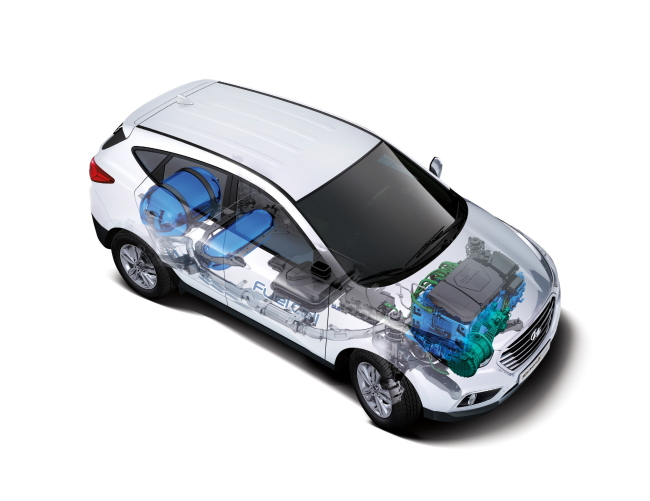Hyundai Motor’s fuel cell engine, which debuted in February on the 2015 Tucson, was named one of the 10 best engines sold in the North American market this year, officials said Thursday.
It is the first time that the annual Ward’s 10 Best Engines have included a hydrogen-powered fuel cell engine.
The Hyundai Tucson Fuel Cell, the world’s first mass-produced fuel cell-powered vehicle, has been sold in Southern California since June 10. Outside the U.S., the car is sold in about a dozen European countries, where the vehicle is known as the ix35.
 |
| The powertrain of the Hyundai Tucson Fuel Cell. (Hyundai Motor) |
“Hyundai engineers did a stunning job of slipping the most advanced automotive technology imaginable into a roomy family vehicle and making it all very consumer-friendly,” said Drew Winter, editor-in-chief of WardsAuto World magazine.
“The car is a great engineering achievement and a giant leap for zero-emission vehicles.”
Hyundai’s fuel cell effectively replaces the battery pack used in most electric vehicles by generating electricity from hydrogen through an electrochemical process, with no moving parts within the fuel cell stack.
The car maintains the day-to-day flexibility of the gasoline-powered Tucson so that its driver is able to immediately enjoy the next generation of electric vehicles without range or recharge-time compromises.
The powertrain has a range of 415 kilometers that compares to some 200 kilometers for battery-powered vehicles. It also can be refueled in minutes instead of the hours it usually takes to charge an electric vehicle battery.
“Being included on the prestigious Ward’s 10 Best Engines list validates Hyundai Motor’s powertrain technology leadership as the fuel cell was the first engine of its kind to be honored,” said Yang Chul-woong, vice chairman of Hyundai’s R&D headquarters in Korea.
“Hyundai Motor will continue to utilize its global R&D resources to develop innovative and game-changing powertrains and technologies, to offer customers more choices when making environment-conscious decisions.”
By Lee Ji-yoon (jylee@heraldcorp.com)



